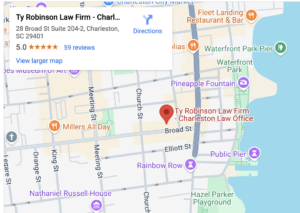Ty Robinson | February 18, 2026 | Truck Accidents
Do You Need a CDL to Drive a Box Truck in Charleston, SC?
No, you typically do not need a Commercial Driver’s License (CDL) to drive a box truck in Charleston, SC. However, if the vehicle’s gross vehicle weight rating (GVWR) exceeds 26,000 pounds, then a CDL is needed. Before you rent a box truck and get behind the wheel, make sure you are familiar with all the…
Ty Robinson | February 13, 2026 | Personal Injury
Are Wolf Hybrids Legal in South Carolina?
Wolf hybrids, also known as wolfdogs, are dogs with a recent wolf ancestor. Their wild appearance attracts some animal lovers, but owning one raises legal and safety questions. If you live in Charleston, South Carolina, and are considering a wolf hybrid, it is important to know how state laws and local ordinances apply. This article explains the…
Ty Robinson | February 6, 2026 | Personal Injury
5 Things You Should Know About a Free Charleston Personal Injury Lawyer Consultation
If you’ve been injured in an accident, you’re probably dealing with more than just physical pain. Medical bills, missed work, insurance calls, and uncertainty about what to do next can pile up fast. That’s why many Charleston personal injury lawyers offer free consultations. If you’ve never spoken with an attorney before, you may not know…
Ty Robinson | January 28, 2026 | Car Accidents
Traffic and Red Light Cameras in Charleston, SC
Traffic and red light cameras are controversial, and South Carolina has banned automated ticketing since 2011. This article explains why the state prohibits these cameras, examines exceptions, compares them with those in other states, and offers safety tips and legal guidance for drivers in Charleston. Keep reading to learn more about traffic and red light…
Ty Robinson | January 21, 2026 | Personal Injury
What Is CTE?
After a serious accident or head injury, it’s normal to worry about what this could mean for your brain long term. One condition you may hear about—especially in sports-related headlines—is CTE, short for chronic traumatic encephalopathy. Below is an overview of what CTE is, what researchers think causes it, and why head injuries should always…
Ty Robinson | January 15, 2026 | Car Accidents
What Is Adaptive Cruise Control, and Is It Safe?
Adaptive cruise control (ACC) is an advanced driver-assistance feature designed to improve convenience and safety on the road. Traditional cruise control allows a driver to set a fixed speed that the vehicle maintains until the driver brakes or manually adjusts it. Adaptive cruise control builds on this concept by automatically adjusting the vehicle’s speed to…
Ty Robinson | January 12, 2026 | Personal Injury
Rules of Mosh Pits: How to Stay Safe
Live concerts bring people together through the power of music. For fans of punk, metal, and hardcore genres, mosh pits are often part of that experience. These high-energy areas near the stage involve pushing, shoving, and physical contact between concertgoers. While many people enjoy moshing, it comes with real risks. Knowing the rules of mosh…
Ty Robinson | January 7, 2026 | Personal Injury
Many Accidents Can Cause Herniated Discs at C4/C5 or C5/C6. Here’s What You Need to Know
Herniated discs are painful injuries that could impact your mobility and ability to live your life as you’re used to. If you have suffered a herniated disc in the cervical area because of another party’s conduct, it can be important to understand what your legal rights are. But what can cause these injuries? What Are…
Ty Robinson | January 2, 2026 | Truck Accidents
Interstate vs. Intrastate Trucking
You may hear terms like “interstate” or “intrastate” trucking if you are involved in a truck accident. These words may sound technical, but the distinction can play an important role in determining who is responsible, what rules apply, and how much compensation may be available. Here is what you should know about the difference and…
Ty Robinson | December 30, 2025 | Personal Injury
Is Flying Safer Than Driving in Charleston, SC?
When planning a trip to or from Charleston, South Carolina—whether it’s for business, family visits, or a beach getaway—one common question many travelers ask is: “Is flying safer than driving?” Let’s break it down using the latest data and safety insights. The Big Picture: Flying vs. Driving Safety in the U.S. According to federal transportation…



